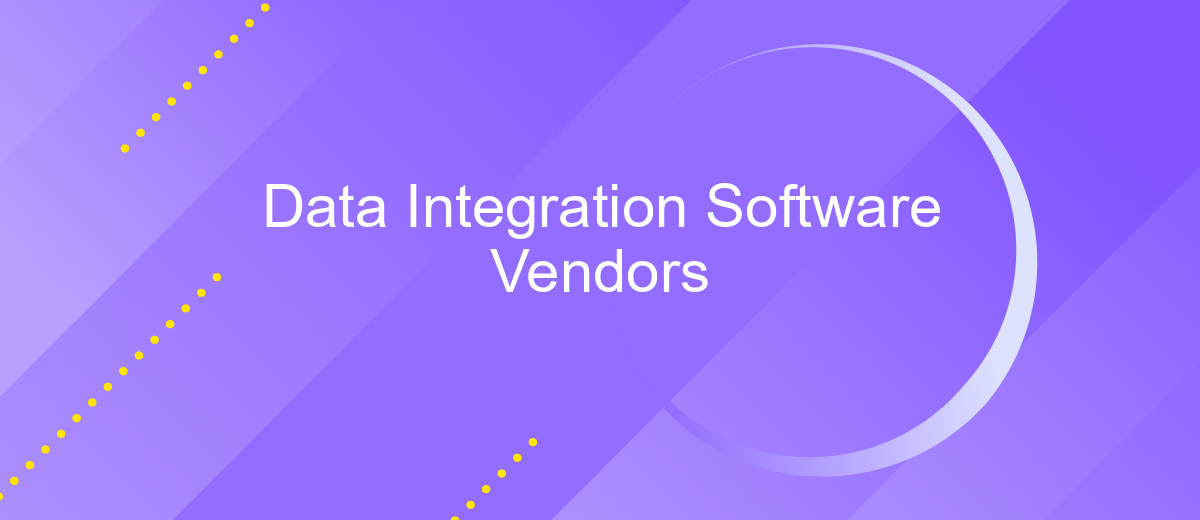Data Integration Software Vendors
In today's data-driven world, businesses rely heavily on seamless data integration to make informed decisions and drive growth. Data integration software vendors play a crucial role in this process, offering tools and solutions that enable organizations to consolidate, manage, and analyze data from diverse sources. This article explores the leading data integration software vendors and their key offerings.
Introduction
Data integration software plays a crucial role in modern enterprises by enabling seamless data flow between disparate systems. As organizations increasingly rely on diverse data sources, the need for efficient integration solutions has never been greater. These tools help unify data from various platforms, ensuring consistency and accessibility for decision-making processes.
- Enhanced data accuracy and consistency
- Improved operational efficiency
- Streamlined data management processes
- Facilitation of real-time analytics
- Scalability to accommodate growing data volumes
Choosing the right data integration software vendor is a critical decision for any organization. It involves evaluating factors such as compatibility with existing systems, ease of use, scalability, and support services. By selecting a reliable vendor, businesses can ensure that their data integration needs are met effectively, paving the way for enhanced productivity and informed decision-making.
Market Landscape

The market for data integration software vendors is rapidly evolving, driven by the increasing need for businesses to seamlessly connect disparate data sources. Companies are seeking solutions that offer robust data transformation capabilities, real-time data synchronization, and user-friendly interfaces. The demand for scalable and flexible integration platforms is higher than ever, making it crucial for vendors to continuously innovate and adapt to changing market needs. Key players in this space are focusing on enhancing their platforms with advanced features like machine learning, artificial intelligence, and cloud-native architectures to stay competitive.
Among the numerous vendors, ApiX-Drive stands out by offering a versatile and user-friendly solution for automating data integration processes. Designed to simplify the integration of various applications and services, ApiX-Drive provides a seamless experience for users, allowing them to set up integrations without extensive technical knowledge. Its platform supports a wide range of applications, making it a valuable tool for businesses looking to streamline their data workflows. As the market landscape continues to evolve, solutions like ApiX-Drive will play a crucial role in helping organizations achieve efficient and effective data integration.
Key Features and Functionality

Data integration software vendors offer a range of key features and functionalities designed to streamline the process of combining data from various sources. These tools enable organizations to efficiently manage, transform, and consolidate data, ensuring consistency and accuracy across systems.
- Data Connectivity: Supports a wide array of data sources, including databases, cloud services, and on-premise systems.
- Data Transformation: Provides robust tools for data cleansing, mapping, and transformation to ensure data quality and consistency.
- Scalability: Capable of handling large volumes of data and scaling with the growth of the organization.
- Real-Time Integration: Facilitates real-time data integration and synchronization to support timely decision-making.
- Security and Compliance: Ensures data security with encryption, access controls, and compliance with industry regulations.
- Automation: Offers automation features to reduce manual intervention and improve efficiency.
- Monitoring and Reporting: Includes tools for monitoring data flows and generating comprehensive reports.
By leveraging these features, organizations can achieve seamless data integration, improve data governance, and enhance overall operational efficiency. Choosing the right data integration software vendor is crucial for maximizing the value of organizational data assets.
Vendor Profiles

Data integration software vendors offer a variety of tools and solutions to help organizations manage, consolidate, and analyze their data from multiple sources. These vendors play a crucial role in ensuring data consistency, accuracy, and accessibility, which are essential for informed decision-making and operational efficiency.
Leading vendors in this space provide comprehensive platforms that support various data integration needs, including ETL (Extract, Transform, Load) processes, real-time data integration, and cloud-based data services. Their solutions often come with advanced features such as data mapping, data quality management, and data governance.
- Vendor A: Known for its robust ETL capabilities and user-friendly interface.
- Vendor B: Offers real-time data integration and advanced analytics features.
- Vendor C: Specializes in cloud-based data services and scalable solutions.
When selecting a data integration software vendor, it is essential to consider factors such as the specific integration requirements, ease of use, scalability, and the level of customer support provided. Evaluating these factors will help organizations choose the right vendor to meet their data integration needs effectively.
- Automate the work of an online store or landing
- Empower through integration
- Don't spend money on programmers and integrators
- Save time by automating routine tasks
Conclusion
In conclusion, selecting the right Data Integration Software Vendor is crucial for ensuring seamless data flow and efficient business operations. With a myriad of options available, it is important to consider factors such as scalability, ease of use, and compatibility with existing systems. Vendors like ApiX-Drive offer robust solutions that simplify the integration process, making it easier for businesses to connect various applications and automate workflows without extensive technical expertise.
Ultimately, the best choice will depend on the specific needs and goals of your organization. By carefully evaluating the features and capabilities of different vendors, you can find a solution that not only meets your current requirements but also scales with your business as it grows. Investing in the right data integration software can lead to improved data accuracy, enhanced decision-making, and greater overall efficiency, positioning your company for long-term success.
FAQ
What is Data Integration Software?
Why is data integration important for businesses?
What features should I look for in Data Integration Software?
How can I automate data integration processes?
What are the challenges of data integration?
Do you want to achieve your goals in business, career and life faster and better? Do it with ApiX-Drive – a tool that will remove a significant part of the routine from workflows and free up additional time to achieve your goals. Test the capabilities of Apix-Drive for free – see for yourself the effectiveness of the tool.


